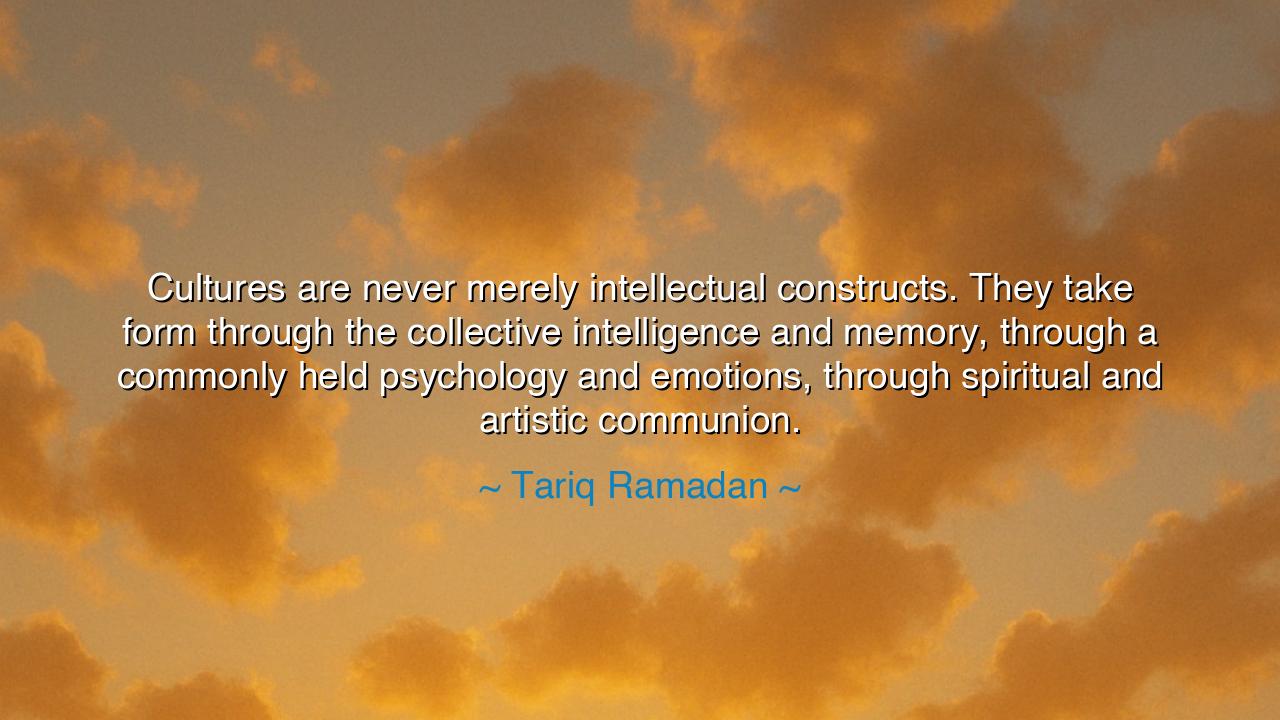
Cultures are never merely intellectual constructs. They take form
Cultures are never merely intellectual constructs. They take form through the collective intelligence and memory, through a commonly held psychology and emotions, through spiritual and artistic communion.






“Cultures are never merely intellectual constructs. They take form through the collective intelligence and memory, through a commonly held psychology and emotions, through spiritual and artistic communion.” — Tariq Ramadan
In this profound reflection, Tariq Ramadan, a scholar of faith, philosophy, and civilization, speaks to the sacred heartbeat of humanity — culture. His words remind us that culture is not born in the cold chambers of intellect, nor written solely in books or laws. Rather, it is the living soul of a people, woven from the collective intelligence, memory, and emotion that bind generations together. He tells us that culture is not built by reason alone, but by love, longing, and the unseen threads of spiritual and artistic communion. A nation, a people, or a civilization does not exist merely because it thinks — it exists because it remembers, feels, and creates together.
The origin of this quote lies in Ramadan’s lifelong study of the meeting points between civilizations — between Islam and the West, between faith and modernity, between tradition and progress. He speaks as one who stands at the crossroads of worlds, calling both East and West to remember that culture is not a battle of ideas, but a shared human expression. His words are a response to the age of fragmentation, when people imagine that societies can be engineered through systems and institutions alone. Ramadan calls us back to the deeper truth: that a culture’s essence is living, not mechanical — it is born in the laughter of its children, the tears of its poets, the prayers of its elders, and the art of its dreamers.
To understand this, one must look to history, where the greatest cultures arose not from decree, but from shared spirit. Consider ancient Greece: its greatness did not lie only in its philosophers, but in the harmony between reason and art — between the geometry of Euclid and the tragedies of Sophocles, between the civic thought of Plato and the sculpted beauty of the Parthenon. Their collective intelligence was inseparable from their collective emotion — their reverence for beauty, truth, and balance. Likewise, the Islamic Golden Age, in which science, poetry, and spirituality flourished side by side, was not merely a time of intellect, but of spiritual communion — a shared vision that knowledge was an act of worship, and creation a reflection of divine beauty.
Culture, as Ramadan teaches, is not an invention, but a memory. It is the echo of ancestors in the minds of their descendants. It is how we remember who we are. When a people loses its memory, it loses its direction — for memory gives purpose to progress, and identity to innovation. The great civilizations that fell did not perish because their armies were defeated, but because their spiritual and artistic communion was broken. They ceased to believe in their own story. When art becomes hollow, when the spirit fades from creation, when emotion is replaced by calculation — a culture may still exist in form, but it has lost its soul.
There is an ancient tale from China, of the Emperor who once asked a wise man what the first thing he should protect in times of war was. The wise man answered: “The poets.” For when the poets die, he said, the people forget who they are fighting for. In every age, this truth remains: the strength of a culture lies not in its weapons or wealth, but in its shared imagination. The collective intelligence of a people is not just knowledge, but empathy — the ability to dream together, to suffer together, to rejoice together. It is in art and faith, in rituals and music, that human beings find the invisible harmony that binds them into one heart.
And so, Ramadan’s words are not simply a description — they are a warning. A civilization that treats culture as an “intellectual construct” alone — as something to be analyzed, dissected, or commodified — will one day awaken to find itself hollow. For culture must be lived. It is born not in institutions, but in relationships; not in policies, but in participation. It demands that we share not only ideas, but meaning. The philosopher may think, the scientist may discover, but without the artist, the mystic, and the storyteller, their work has no soul.
The lesson, then, is this: nurture the soul of your culture. Protect its music, its stories, its spiritual rhythm. Honor your ancestors not just by remembering their names, but by continuing their songs. Let your intelligence be guided by compassion, and your progress be rooted in memory. Celebrate difference, for true collective intelligence is born from many voices singing in harmony, not in unison. And never forget that the greatness of a people lies not only in what they build, but in what they believe together.
So, my children of tomorrow, when you think of culture, do not look only to the halls of academia or the monuments of stone. Look instead to the hearts of the people — to the shared emotions, memories, and dreams that make a nation live. For it is in that unseen communion of spirit that civilizations endure. And when all else fades — the empires, the wealth, the machines — what remains, eternal and unbroken, is the song of the soul we call culture.






AAdministratorAdministrator
Welcome, honored guests. Please leave a comment, we will respond soon